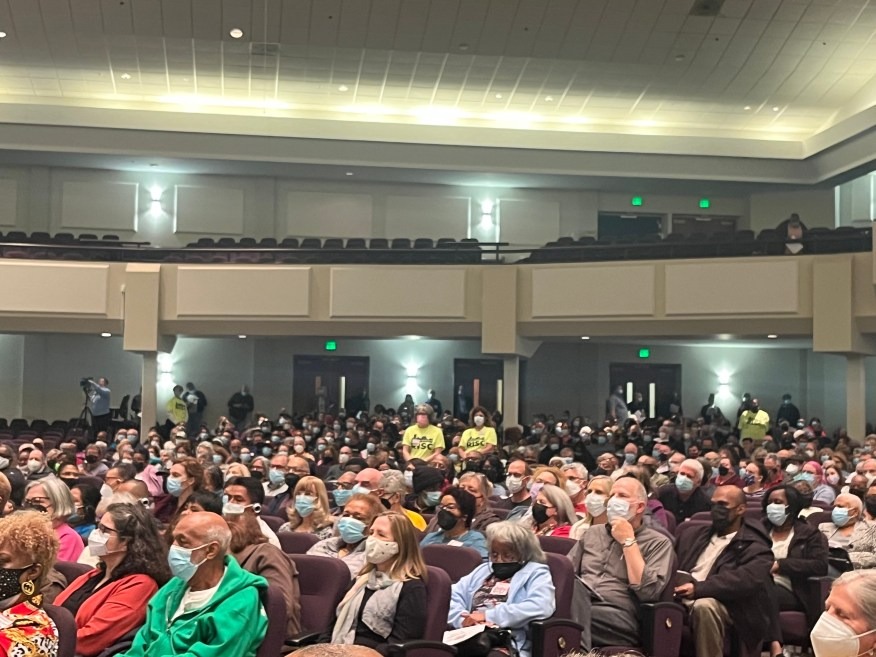By Dean Mirshahi, WRIC
About 1,200 members of an activist group gathered at a Richmond church to voice their frustrations over housing issues and gun violence in the city and call on leaders to support steps they believe will help address each crisis.
Richmonders Involved to Strengthen Our Communities (RISC), a justice ministry organization comprised of 22 congregations from Richmond, Henrico and Chesterfield, held its annual Nehemiah Action Assembly at Saint Paul`s Baptist Church North in Richmond on March 28.
The group has continued to push Richmond city council members and Mayor Levar Stoney to put money into the city’s Affordable Housing Trust Fund, to release funding to repair and replace mobile homes and implement a program known as Group Violence Intervention.
RISC leaders said that the mayor has continued to ignore their efforts to meet with him and did not respond to an invitation to the Nehemiah Action Assembly.
Stoney did declare an affordable housing crisis hours before the assembly, a move that RISC members did not think was a coincidence. The chair reserved for the mayor remained empty on stage throughout the group’s assembly.
RISC leaders asked the four Richmond City Council members who attended the assembly and got up on stage — Ellen Robertson, Stephanie Lynch, Andreas Addison and Ann-Frances Lambert – whether they would pledge their support for those efforts, which they did for some but not all.
A divide over affordable housing funding
RISC has been critical of the city’s approach to funding affordable housing, with much of its focus on a trust fund established to give loans and grants to help develop affordable housing in Richmond.
In 2021, City Council passed an ordinance to use a portion of real estate tax revenue for a special reserve that would act as a dedicated funding stream for the trust fund.
RISC members accused the city of breaking promises and not following its own laws for not using the special reserve to fund the trust fund. They called on the city to put the money – including the $2.4 million that was set aside in the 2022 fiscal year – into the trust fund.
The city instead opted to dedicate $20 million in federal COVID-19 aid money to support affordable housing developments in the 2022 and 2023 fiscal years.
“In the last several years, that $20 million has been able to let us leverage, in the ballpark of 2,000 new affordable units to be put into construction, so that we can try to catch up on our need for more affordable housing across the city,” Richmond’s Chief Administrative Officer Lincoln Saunders said in an interview Wednesday.
Councilwoman Robertson told 8News that the city would have put the money into the dedicated source of revenue as planned, but said Richmond faced “outstanding consequences” related to the pandemic and needed to adapt.
“That money came to us, we made the decision to put $20 million into affordable housing and with that decision, the general fund dollars that would have gone there if we didn’t get that money went to take care of other critical needs that we had in the city secondary to covid,” she said after RISC’s assembly.
“You got to make decisions based on what’s going on at the time.”
RISC gets commitments on affordable housing and mobile home funding
During RISC’s annual assembly, the four city council members said they would seek to have the city put the $10 million in bond revenue set aside for affordable housing projects in Stoney’s budget proposal for the 2023-24 fiscal year into the trust fund.
Mayor Stoney is proposing a bond program committing to a $50 million investment over the next five years for affordable housing projects in the city, a path RISC has raised several concerns about.
Putting money into the trust fund is the preferred path, RISC co-president the Rev. Amy Starr Redwine told 8News, because, unlike the bond program, the affordable housing trust fund is overseen by a board that makes funding decisions.
The trust fund also requires a third of the money to be used for units for households earning 30% or below the area’s median income (AMI). Rev. Redwine said another reason RISC is pushing for money to be put into the trust fund is that it has a leverage rate of 6.5 times, which the group says will result in “an additional $65 million leveraged yearly” in state, federal and private funds towards affordable housing.
The council members also committed to backing a resolution calling for the city to immediately release $300,000 for a mobile home repair and replacement program that RISC said Stoney’s administration never made available despite it being set aside in this year’s budget.
Instead, the mayor’s latest budget proposes adding that funding to $500,000 in next year’s budget to create a revolving loan program for mobile home residents.
To Rev. Redwine, the commitments show that RISC is “willing to take new information and work with it,” adding that the group’s focus is finding help for the most vulnerable, including the many mobile home residents who fear to speak out on their own because of their concerns over unknown consequences.
The city council members at RISC’s assembly said they would support structuring the mobile home repair and replacement program to ensure repair costs would be fully covered for qualifying residents.
According to RISC, council members also said they would require the program’s administrators to help residents secure a loan to replace a mobile home that would not force them to pay more than 30% of their monthly income, including their rent, per month.
Redwine said that RISC is uncertain whether budget amendments are needed for either effort, adding that the group has many unanswered questions and will follow up with city leaders.
The city defends Stoney’s affordable housing proposal
Saunders, the city’s chief administrative officer, said he doesn’t view RISC’s position as criticism, but said the group is raising valid concerns that the city has the opportunity to address head-on.
He defended the mayor’s proposal to fund affordable housing in the city, saying the safeguards that RISC was aiming for would still be available under Stoney’s budget, including ensuring that a portion of the funds from the bonds is used to build housing at 30% AMI or below.
“First and foremost, the bond proceeds can be utilized in the same way that the general fund commitments previously were, be it under the oversight of the affordable housing trust fund,” Saunders told 8News. “There is nothing that will prevent the trust fund from being a key stakeholder and/or if council desires, overseer of how the $10 million is spent.”
Saunders also noted “deficiencies in the trust fund model,” saying that under state law such funds can only oversee local dollars given to it under the trust fund management and that the affordable housing trust fund is barred from overseeing other available funding streams.
According to Saunders, the bond program would put Richmond in a stronger position to seek additional partners and investors “to leverage to double or more” its investment, which he noted would be leveraged by those in the private sector.
He added that much of the funding from the bond program would likely be used as gap financing to fund affordable housing.
“If we were to look at our current or prior plans for funding affordable housing through abatement roll-offs, we would only be able to put a little over $2 million towards affordable housing this year,” Saunders told 8News.
“We just don’t think that’s sufficient to meet the need we have in the community.”
Looking ahead
The council members told RISC members they would not call on Stoney’s administration to allocate the $2.4 million into the trust fund that was set aside for it in the 2022 fiscal year.
RISC said it would continue to hold the city accountable to transfer the “missing dollars,” with Redwine comparing the city’s response to someone with a past due electric bill who decides to ignore it but pay their next bill.
“Well, because that’s $2.4 million more for affordable housing and because there was a budget commitment made to put that money into the trust fund last year,” Redwine said when asked why RISC would continue to press for the money to be put into the trust fund. “We understand the reasons that we were given for it, but we still think that money should have been put into the trust fund.”
Saunders did not answer how much is in the affordable housing trust fund or the special reserve but said the trust fund “has a critical piece of the future” for how Richmond addresses affordable housing.
He said that the city believes in looking into a “broader housing commission” that would incorporate all stakeholders to ensure Richmond’s strategies for maximizing the amount of affordable housing in the city “are meshing and intersecting in a coordinated way.”
“But the trust fund is going to also have to evolve to be able to play a role in helping guide how we address housing needs across the full spectrum and using all potential revenue streams that we have,” Saunders added.
Richmond’s City Council will vote on declaring an affordable housing crisis on Monday and is currently undergoing the budget amendment process. The council has until the end of May to pass a final spending plan.
View the original story here.






